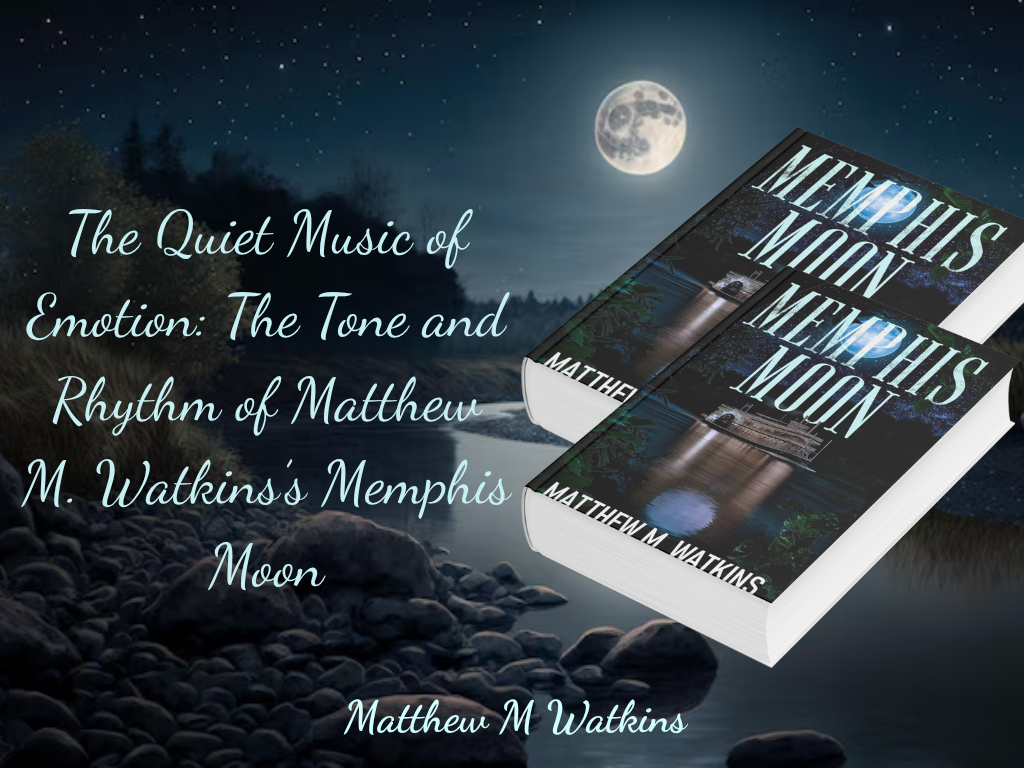Every writer has a sound, a pulse that runs beneath the language, steady and distinct. In Memphis Moon, Matthew M. Watkins voice beats softly but with deep resonance. His prose doesn’t shout; it breathes. It doesn’t race; it lingers. Through this quiet rhythm, Watkins creates a world that feels both intimate and timeless, allowing emotion to unfold with the patience of memory.
Watkins’s emotional tone can best be described as measured tenderness. The story he tells, of love, loss, and endurance set against the backdrop of the Civil War, could easily invite melodrama. Instead, he chooses restraint. His sentences are deliberate, unhurried, and balanced with silence. Where another writer might fill the page with noise, Watkins lets the pauses do the work. The ache between his lines becomes as meaningful as the words themselves.
This restraint gives Memphis Moon its haunting power. The grief Caleb Dawkins carries, the strength of Ginnie Moon’s convictions, the quiet grace of Lottie’s faith, these emotions rise gradually, like the light before dawn. Watkins doesn’t force the reader to feel; he trusts that the truth of the moment will do that on its own.
In the press release and featured article about the novel, Watkins describes writing Memphis Moon as “listening for what history wanted to say.” That listening shapes not just the content, but the tone. Each scene feels composed like music, the steady rhythm of daily life interrupted by sharp notes of pain or joy. The sound of the millwheel turning, the rustle of paper as Ginnie writes, the distant echo of cannon fire, all of it forms a kind of emotional score that carries the story forward without ever breaking its quiet dignity.
What’s striking is how Watkins blends lyrical beauty with emotional honesty. His language is simple, but never plain. He writes with a musician’s sense of cadence, each word carefully placed, each phrase allowed to resonate. The result is prose that feels sung as much as written. It moves in waves, alternately gentle and strong, mirroring the ebb and flow of memory itself.
The tone of Memphis Moon is also deeply compassionate. Watkins never judges his characters, even when they falter. He allows them space to grieve, to doubt, to fail. This moral patience, the refusal to rush redemption or resolution, is part of what makes the novel so emotionally authentic. Every tear, every prayer, every act of forgiveness feels earned.
Even the novel’s depiction of the Civil War, an era heavy with conflict and cruelty, is handled with remarkable balance. Watkins avoids sensationalism; his focus remains on the inner landscapes of those who endured it. The war, in his hands, becomes less about victory and defeat, and more about the endurance of grace. His tone toward history is reverent, not nostalgic, an acknowledgment of pain, but also of persistence.
What gives Memphis Moon its lasting impact is not what happens, but how it feels. The book’s emotional rhythm never rushes toward climax or closure. Instead, it invites reflection. Watkins’s tone reminds readers that love and loss are not opposites, but companions, that grief itself can be a form of remembrance, and remembrance a form of love.
By the end of Memphis Moon, readers realize they have not just read a story; they have experienced an emotional symphony played in whispers. Watkins’s tone, tender, steady, and profoundly humane, ensures that the novel stays with you long after it’s finished. The memory of it hums quietly in the mind, like a hymn that refuses to fade.
In that lingering stillness lies the beauty of Watkins’s art: the understanding that emotion, like music, doesn’t need to shout to be heard. It only needs to be true.

